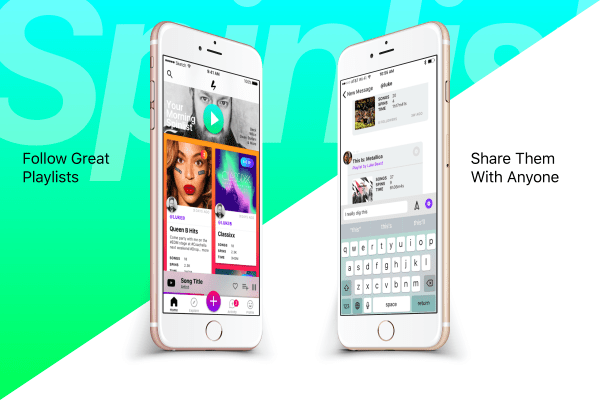Music streaming continues to grow as a proportion of our recorded music consumption, with 47% of all recorded music revenues coming from streamed services in the U.S. in the first half of 2016, according to the RIAA. And in the wake of that wave of usage, we’re seeing the emergence of new startups trying to enhance the listening experience across all of them.
Among them is a new service called Spinlist created by Lucas Buick, the co-founder of Hipstamatic (the early precursor to so many of the photo filter apps that then flooded the market). Spinlist lets users discover, create and share playlists that can be heard across any streaming service that you might use, and it will let you listen even if you use none of them. It’s starting first with deals in place with Spotify, Apple Music, Soundcloud, and YouTube; Amazon Music, Pandora Plus, Tidal, Deezer, Google Play Music, and more will come soon, Buick said.
Spinlist is launching today in an invite-only beta on iOS and the web. (Note: be prepared for the beta — my test drive of the app on my iPhone saw it crash a few times.)
If the concept of an app that lets its users share what they are listening to with others sounds familiar… that’s because it is indeed a well-known tune.
Soundtracking, This is my jam, Bop.fm, Turntable.fm and many others tried (and ultimately failed) to build businesses around this idea, with varying degrees of traction and funding, as well as licensing heat from labels, streaming music companies and others in the ecosystem.
Apart from the large hurdles of getting an audience, funding, and buy-in from music rightsholders, another one of the big challenges is that the streaming services themselves have tried to cater to those in their own silos, creating ways both for regular and new users to find things to listen to by pushing playlists created by power users and other ways of essentially programming what you listen to so that you don’t have to figure that out for yourself.
Buick is undeterred by the trail of defunct startups and offerings from streaming services themselves. Why? He believes that even if, for example, Spotify is seeing a lot of traffic from Discover Weekly (one of its several features that recommends music to listen to), Apple continues to build out its Radio service, and Amazon is making it very simple (and cheap) to use its music service with its popular Echo devices, there is still a larger market of people out there who are not being addressed by any of this.
“More people share music through burned CDs than streamed playlists,” he said, citing a stat he heard from a music executive last year. Given how popular streaming is now, and perhaps the fact that Buick himself says he no longer owns a CD player, he thinks that speaks of a gap in the market, addressing some of the fragmentation in the streaming industry.
He also feels that the streaming market grown enough that services like Spinlist might have more audience now than they would have had even a year or two ago. “I think a lot of those other startups might have been ahead of their time,” he said. And there is also the advance of technology: Spinlist mixes both human curation with the seemingly inevitable involvement of bots powered by AI. I have had a look at the app, and at least in its earliest form, the content stretches into the more eclectic. (More than one playlist inspired by Saved By The Bell?) The bots are not mainstream in their tastes to say the least.
In any case, the gaps for better social connections around music, and music recommendation and discovery, are clear enough, and Buick’s track record and pitch for this was impressive enough, that Spinlist has attracted some notable early funding — namely a pre-seed round of an undisclosed amount led by Sparklabs Global; with Frank Meehan, who had been on the boards of both Spotify and Siri, joining Spinlist’s board.
